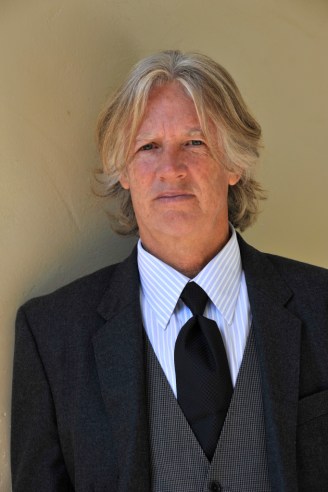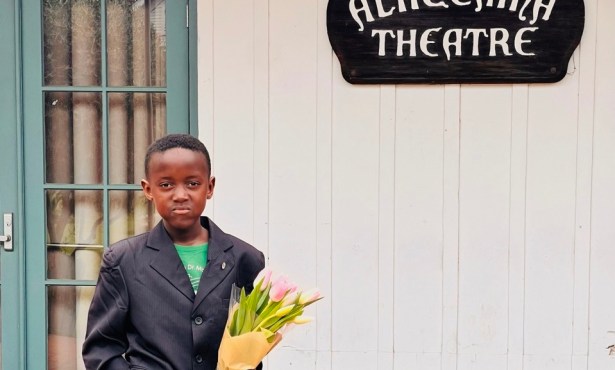A New Coming-of-Age Novel From One of Santa Barbara’s Famous Sons
A Q&A with Writer Monte Schulz
Monte Schulz is the author of the Jazz Age trilogy Crossing Eden, and Down by the River, among other works. Owner of the Santa Barbara Writers Conference, Schulz, who is the eldest son of late cartoonist Charles M. Schulz, the creator of Charlie Brown and the rest of the Peanuts gang, wrote his coming-of-age novel, Metropolis, over a span of many years.

Schulz — who will sign Metropolis at Chaucer’s Books on Tuesday, November 15, at 6 p.m. — shared some insights about his latest book.
Metropolis is a big, ambitious book, and readers will want to know what it’s about and why they should read it. At its heart, Metropolis is a love story occurring in the crucible of a century-long eugenics war. Our narrator is a college senior, Julian Brehm, drawn by the irresistible gravity of romance to a lovely young bohemian revolutionary, Nina Rinaldi, who lures him into a vast labyrinth of danger and deceit, both above and below the streets of a society in moral collapse. Survival is not assured, with threats from many angles, as Julian’s adventure leads him from the familiar comfort of family, college life, and his beautiful Nina to places he had never imagined could exist in this world.
Julian Brehm is both sweet and, at least in the beginning, deeply naïve, though his eyes are opened very wide over the course of the novel. What was it like telling the story from his perspective? I’d never written in first person before beginning Metropolis. The traditional third-person omniscient narrator always felt more expansive and complete. Yet I had read novels written in first person — not to mention the literary essays of Joan Didion, Norman Mailer, Truman Capote, and others — that offered both clarity and lyrical evocation of place and ideas. So, the experience of Julian Brehm telling the story turned out not to be as daunting as I had imagined. In fact, I enjoyed his very acute and emotional viewpoints on everything occurring to and around him: how he felt about Regency College; his roommate, Freddy Barron; his mother, father, and sister; and then Nina Rinaldi, with whom he quickly fell in love. I never thought of Julian as naïve early on so much as intuitive while lacking in experience and perspective on the world he’d grown into. Therefore, I was pleased to show the reader how Julian recognized his youthful ignorance, and how keen he was to survive it.

Readers wanting to take an online deep-dive into the book can visit metropolisthebook.com. On the website, it’s easy to visualize just how much work you’ve put into creating the world of Metropolis. Here, we can see that you’ve invented scores of places, dozens of inventions, and whole canons of music and literature. What were the biggest challenges, and pleasures, of coming up with all this material? And how did you keep track of such a complex nexus of information? The republic and society of Metropolis is not ours, but could be, as if history bifurcated 1,500 years ago and gave us Julian’s world. All through the writing I was convinced that the republic ought to feel recognizable, as though with a wrong turn here or there, it could be the story of us. So much of inventing those names that I did create came from books I kept at my desk, novels set in Mexico and South America, Tangier, France, and excursions into the Paris arcades and a yearbook for the University of California, 1898. It was intriguing and easy naming certain characters, districts and provinces, motor cars, food and drink of all sorts, colleges and institutes, weapons of war, arcane medicines and books, etc. I did not build lists of these until the novel was written, had no true idea how much I had invented, though I was urged to collect it as a glossary. Instead, we put them into my website where it’s all more easily viewed and understood.
It sounds like a sequel is in the works. Without giving away any big spoilers from Metropolis, where do you see things heading in the next novel? I am writing a sequel to Metropolis called Undercity with the character of the assassin Marco Grenelle being the central narrator. While his story begins where Metropolis ends, throughout the narrative Marco gives us his personal history and that of his companions, where each of them came from and what life was like in the horrid underclasses of that society both above and below ground, persecuted by eugenics. Also, Undercity is structurally much different from Metropolis in that besides Marco’s narrative, there are other voices as storytellers giving us insight into the larger perspective and culture of the republic, past and present. Titles of these vignettes include The Bookseller, Gypsy, Policeman, Magician, Doctor, Professor, Mayor, and many others, each with his or her own tale to tell that adds to the tapestry of that world we’ve only been given a glimpse of in Metropolis.
Support the Santa Barbara Independent through a long-term or a single contribution.




You must be logged in to post a comment.